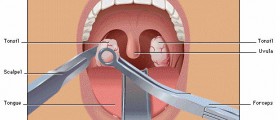
Middle ear infection or otitis media is a painful ear infection affecting the part behind the eardrum. This type of infection can be caused by bacteria or viruses and, since it is painful and discomforting, it disturbs the normal daily routine of a person suffering from it. It can also cause some difficulty hearing.
A middle ear infection can be acute or chronic. An acute middle ear infection is a result of a viral upper respiratory infection, such as common cold or flu. The infection spreads from the nose to the ear and causes a secondary infection. Chronic middle ear infection is an ongoing, persistent infection that results from untreated or poorly treated acute infection or from a ruptured eardrum.
Symptoms of chronic middle ear infection
The symptoms of a chronic middle ear infection are basically the same as those in an acute middle ear infection. The usual symptoms include persistent feeling of fullness and pressure inside the ear, ear pain, partial hearing loss, fatigue, headache, fever, chills, irritability and loss of appetite. In some cases pus and blood may start oozing from the ear, followed by relief from pain, which indicates that the eardrum has ruptured.
Infants and toddlers cannot express their symptoms but they can be recognized as the child tugs or rubs the ear, does not sleep well and does not have appetite.
Treatment for chronic middle ear infection
It is important to determine whether the infection is bacterial or viral. In viral infections, the treatment should consist of home remedies and pain medications, such as Tylenol. Unfortunately there is no specific cure for viral infections and the patient will have to wait until the immune system fights it by itself.
Bacterial infections must be treated with antibiotics. In mild cases, antibiotic eardrops will do, but in chronic or severe cases it may be required to take oral antibiotics or injections.
Corticosteroids are sometimes recommended to reduce inflammation and pain. During the treatment for middle ear infection it is recommended to rest and sleep as much as possible, to drink plenty of fluids and ear well.
Complications of chronic middle ear infection
Any infection that lasts longer than normally, and that is therefore considered chronic, carries an increased risk of complications. In chronic middle ear infection, the complications may include brains abscess, Bell’s palsy, partial or complete loss of hearing, enlarged adenoids, ruptured eardrum and meningitis.
It is highly recommended to see a doctor as soon as the symptoms of a middle ear infection appear. Chronic infections usually occur when the therapy is not completed, which means they can be avoided by following the doctor’s instructions regarding the treatment.

















Your thoughts on this
Loading...